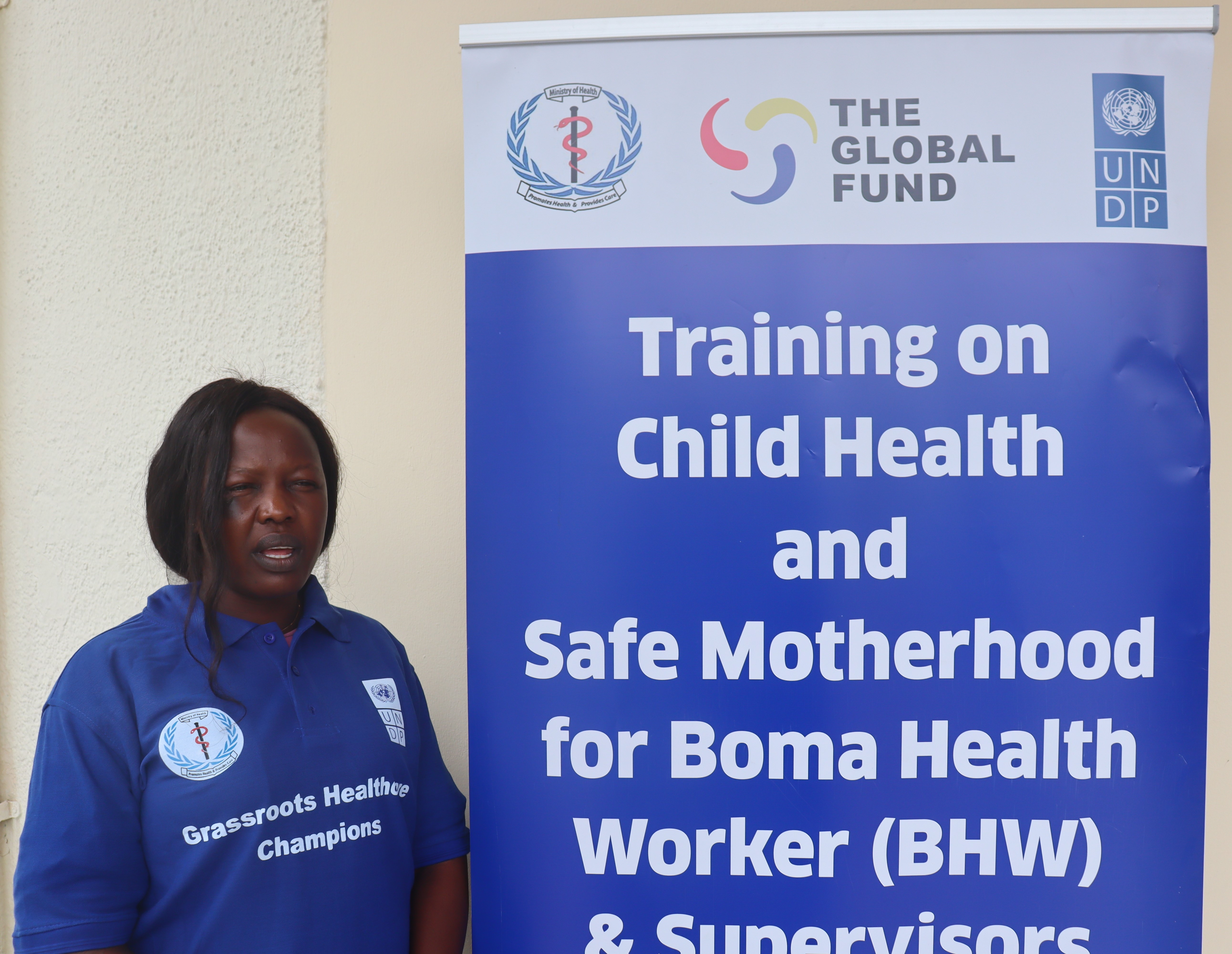As frontline community health workers, Boma Health Workers (BHW) do health promotion, disease prevention and primary healthcare delivery, and help people adopt healthy behaviours.
Empowering Communities: Boma Health Workers Trained, Deployed to Enhance Child and Maternal Health
August 5, 2024

Officials from the Ministry of Health and UNDP pose with Boma Health Workers and supervisors after the commissioning ceremony
Community health workers play a vital role in ensuring that health services reach vulnerable people in remote and underserved areas. In South Sudan, the Ministry of Health and partners are using the Boma Health Initiative – a government flagship programme on community engagement. As frontline community health workers, Boma Health Workers (BHW) do health promotion, disease prevention and primary healthcare delivery, and help people adopt healthy behaviours.
'Boma' means village in the local dialect, denoting the smallest administrative unit in the world’s youngest nation. The BHWs operate at the grassroots level of the health hierarchy, which demonstrates a commitment to providing health services to remote and underserved areas. With an estimated 2,000 bomas across the country, the full implementation of the BHWs initiative will move the country closer to achieving global targets for universal access to health and well-being.
The latest in this effort is the training and commissioning of 84 BHWs and supervisors to give basic child health and safe motherhood services in Juba County, Central Equatoria state. The trainees include individuals who have previously worked in health facilities and community members who have completed secondary education.

Equipped to serve. Boma Health Workers and supervisors after the commissioning ceremony
For HIV/AIDS and TB, BHWs will also be involved in contact tracing, ensuring that individuals enroll and complete their medication regimens for improved treatment outcomes. Solomon Anguei Mayuot, the Boma Health Initiative (BHI) National Coordinator at the Ministry of, said the latest cohort of trainees has been trained to treat common diseases that affect and kill children such as malaria, diarrhoea, pneumonia and screening for malnutrition. They will also give health education to pregnant mothers, promote uptake of health services and sensitize people on the prevention of TB, AIDS, and other diseases.
Jacklin Mensona, one of the facilitators, said the BHWs have also been trained on safe motherhood, focusing on antenatal care (ANC), family planning, nutrition, post-natal care and promotion of immunization uptake. “They are required to visit mothers and newborns. In case of any signs of danger, they are supposed to refer them to nearby health facilities,” Jacklin Mensona said, adding, “We hope that they will reduce malnutrition and deaths from prevalent diseases in the community, such as malaria.”

Jacklin Mensona
Getting pandemic-ready
Dr. Nathan Atem, the Director General for Primary Health Care at the Ministry of Health, emphasized the need for stronger health systems, noting that communities with robust health structures were less affected by the COVID-19 pandemic. “The world is moving towards community health. COVID-19 is not the last outbreak of international concern; so, we need to strengthen pandemic preparedness by building strong community health structures.”

Dr. Nathan Atem, the Director General for Primary Health Care at the Ministry of Health, during the commissioning ceremony
Citing a recent Ebola outbreak that was contained in Uganda, he challenged BHWs, saying, “You have a regional responsibility to contain disease outbreaks so that they don’t spread to neighbouring countries and communities.”
Dr. Atem also condemned the needless loss of children's lives through shunning immunization or being brought to health facilities when their conditions have deteriorated. He also condemned the loss of mothers due to pregnancy complications because they avoid ANC visits and giving birth in medical facilities.
Performance-based monthly stipend
Boma Health Workers will receive a monthly incentive of US$50, while their supervisors will receive $100 for the next three years, thanks to financing from the Global Fund.
CORDAID’s Gerald Agaba informed trainees that their payment will depend on performance, including the timely submission of reports in the District Health Information System 2 (DHIS2) by the 10th of every month on key deliverables such as people reached, patients referred to health facilities, and health education sessions conducted. He urged BHWs to be diligent in their work, saying, “Be honest with yourselves and the communities you are serving. Don’t start charging people and mothers who come to you for help.”
The Boma Health Initiative is a cornerstone of South Sudan’s effort to enhance community health and deliver essential services at the grassroots level. Since its launch in 2017, United Nations Development Programme (UNDP), with funding from the Global Fund, has been a proud partner in this journey, supporting the Ministry of Health and contributing to the training and empowerment of BHWs and their supervisors. UNDP’s involvement goes beyond training. We strengthen health systems through integrated approaches that encompass health infrastructure, supply chain management, and community health initiatives.

CORDAID’s Gerald Agaba (L) and UNDP’s Dr. Kibebu Berta during the commissioning ceremony
Trainees speak out
Many trainees left the commissioning ceremony determined to make a difference in their communities. Hillary Lujanga Eriko, one of the BHW supervisors, said, “People in our communities are using local herbs. Through health education, we are going to change that and make them embrace medical care.”
On her part, Agnes Kaku Lino said, “We have learnt about diseases that affect children, such as malaria, diarrhoea and pneumonia, and how to handle pregnant women. We refer all pregnant women to the nearest health facility. We don’t handle them.”

 Locations
Locations